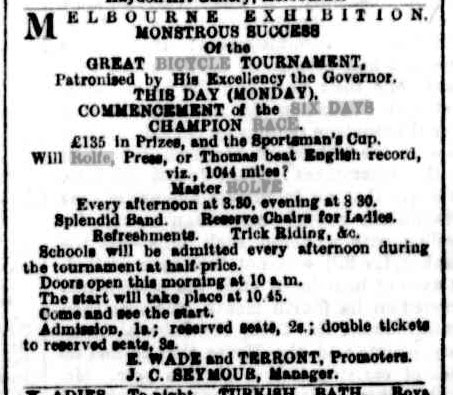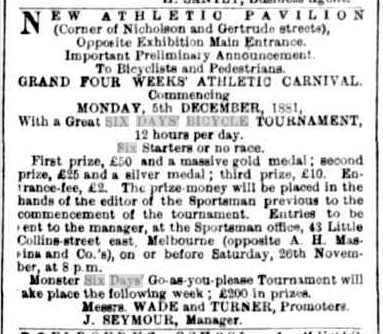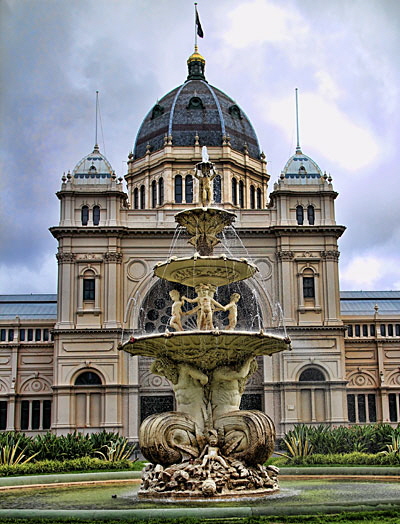 |
|
|
 |
Australian Six Day Races
|
|
One of the gaps in the coverage of worldwide Six Day cycle races is of those held in Australia. This is a basic attempt to collate some of the information into a single resource.
|
|

|
|
Advertising the 1882 Melbourne Six Day Bicycle Race
The Argus, Monday 18-Sep-1882
|
|
19th Century
Six day races seem to have started in Australia in 1881 and to have followed a similar pattern to those in England and the USA.
The rider than dominated the headlines in the early years was Jack Rolfe. Little is known about Rolfe except from this short note from an Australian researcher / relative “Jack Rolfe came out from Birmingham, England in 1879 and started (or was at least involved with) the "Sydney Bicycle Works" in 1894. Newspapers at the time proclaimed him "world champion cyclist" as he challenged riders from Scotland and America. I believe he moved to Ballarat and later Bendigo in Victoria and set up shop there and started making Rolfe Cycles. His son Herbert, was also a champion rider.”
There was also some sort of connection to the Terront family; one of whom is listed as a promoter of the 1882 Melbourne Six. Charles Terront won Six Day races in London, Boston, Chicago, Edinburgh and Hull plus the Paris-Brest-Paris road race.
This is the list of all the early races that have been found in the press or at the Memoir du cyclisme web site.
|
|
Date
|
Location
|
Result
|
|
5 to 10 December 1881
|
New Pavilion, Nicholson Street, Melbourne
|
1. Jack ROLFE; 2. W J PRESS; 3. C IRISH
|
|
19 to 24 June 1882
|
Pavilion, Central Market, Adelaide
|
1. Jack ROLFE; 2. W J PRESS; 3. G SPICER more>>
|
|
18 to 23 September 1882
|
Exhibition Building, Melbourne
|
1. WJ PRESS; 2. Jack ROLFE; 3. J THOMAS
|
|
23 to 28 October 1882
|
Exhibition Building, Prince Alfred Park, Sydney
|
1. Jack ROLFE; 2. C IRISH; 3. H MITCHELL
|
|
1883
|
Sydney
|
1. Jack ROLFE
on Memoir du cyclisme; but likely to be 1882 race
|
|
25 to 30 April 1887
|
Exhibition Building, Melbourne
|
1. Sam CLARK of Aberdeen; 2. R ROBERTS of Newcastle NSW; 3. G WYBURD of Bathurst
|
|
30 May to 4 June 1887
|
Exhibition Building, Melbourne
|
Pro 1. Fred WOOD of Leicester, England; 2. G WYBURD of Bathurst; 3. R MITCHELL of Melbourne
Am 1. J W H BUSST; 2. BROWN; 3. D W SWAN
|
|
1890
|
Melbourne
|
1. Sam CLARK
on Memoir du cyclisme; but likely to be 1st 1887 race
|
|
|
|
Quite why the races stop so suddenly is not clear - but that is all we have from the Victorian era. And even this limited information has mostly been the work of SixDay.Org - using the Trove online resources.
|
|
Some press cutting about the first Australian Six Day Race -
|
|

|
|
Advertising the first Australian Six Day - the 1881 Melbourne Six Day Bicycle Race - from The Argus for Wednesday 23-Nov-1881
|
|
“CHAMPION BICYCLE TOURNAMENT.
The six days bicycle tournament for the championship of Australia was brought to a termination in the New Pavilion, in Nicholson street at 11 o clock on Saturday night. On Saturday morning Irish, Rolfe, and Shackleford led off, the former at a great pace to endeavour to reach Press, who was then 9 1/4 miles ahead, but as the day advanced, and he saw the attempt would be useless, he eased off. Press came on a few minutes after the hour for starting, and maintained a steady pace all day. Rolfe also kept at his usual speed, occasionally spurting, and leading the others as he liked. At noon the scores stood as follow:- Rolfe 768 miles 8 laps; Press, 751 milea 8 laps; Irish, 742 miles; Shackleford, 603 miles 5 laps, and Hoskins, 417 miles 2 laps. At noon the speed waa decreased, and Rolfe went off for 43 1/2m., Irish for 73m., and Press for 28m. In the evening there was a very large attendance of spectators, and each spurt by the competitors was loudly cheered. At 20 minutes to 11 the final spurt was made and when time was called Rolfe had won the championship, having covered 910 miles 8 laps. Press second with 891 miles 11 laps, and Irish third with 880 milea 7 laps. Shackleford’s distance was 719 miles 1 lap; Hoskins, 426 miles 9 laps, and Spicer, who retired the third day, 451 miles 2 laps. The last mile was covered by Rolfe in 3min 20sec. The average made by the winner was a little under 130 miles a day, but had it not been for the inclement weather, he could have covered 1000 miles. Press, the South Australian champion rode a plucky race, and Irish, notwithstanding the injury to his knee on the second day, performed very creditably.” The Argus (Melbourne, Vic) Monday 12 December 1881 |
|
THE SIX DAYS' BICYCLE CONTEST.
The Sportsman gives the following account of the bicycle contest for the championship of Australia:— 'This event, the most important in bicycling that has yet occurred south of the Line, commenced on Monday, December 5, at noon, at the Pavilion, Melbourne. The representatives of New South Wales and Tasmania declining the contest, the number of competitors who faced the referee (Mr. W. H. Lewis) at the start was reduced to J. Rolfe, champion of Victoria, C. Irish, Press, champion of South Australia, G. Spicer, H. Shackelford, and Hoskins. Irish rode an excellent machine by Bayliss & Thomas, nickel-plated ; Hoskins, a D.S.H.R. Invincible; Rolfe, a Singer's British Challenge; Spicer, D.H.F. Premier; Press, 54 Imperial Singer; and Shakelford, a machine by a private maker. The pace was very warm, the first mile (12 laps) being done in four minutes, Hoskins, travelling too near the canvas, caught his foot and fell, bringing Spicer after him. Hoskins wrenched his ankle somewhat and had to retire. Rolfe seemed a master of the art of bicycle-riding, having perfect control over his machine, working with great power from his legs, and apparently sending his bicycle along at a fast pace with little or no effort. Irish has a very taking style, a pretty seat, plenty of strength, and quickly covers the ground. Press, the South Australian champion, is very wiry, and is capable of travelling at an exceedingly fast pace. His style is very pleasing, and he quickly became a favourite among the spectators. Spicer, Shackelford, and Hoskins are each of them well-known riders, and considerable Interest was manifested in them. At 3:35 Rolfe had covered the first 50 miles. Press, who had travelled very quickly, went off the track after completing 63 miles. At 5 o'clock Spicer retired for refreshment, after covering 60 miles, and at a quarter past 5 returned in company with Press. Rolfe at this time had a decided lead of 4 laps of Irish, who was second, with Press third, and Spicer, Shackelford, and Hoskins in succession. This order was maintained for a considerable time, and at 22 1/2 minutes past 7 Rolfe completed 100 miles, in 7 hours 22 1/2 seconds; Irish, 99 miles 8 laps ; Press, 91 miles; Spicer, 85; Shackelford, 81; and Hoskins, who had temporarily retired, 42. At 9 o'clock some wet sawdust got under the tire of Shackelford's machine, and had the effect of giving him a nasty cropper, bringing Press and Rolfe over him. They were soon remounted, but shortly after Press, in endeavouring to increase his speed, fell at the east end, causing some injury to his machine. Irish, with com- mendable consideration, allowed Press to use a spare machine. For the remainder of the evening the racing was very exciting, and met with the frequent applause of the spectators. At half-past 10 Irish, who was riding splendidly, very nearly had a severe accident, for a person stupidly endeavoured to cross the track, and Irish, in trying to avoid her, was thrown head over heels, sustaining a nasty graze on the left side. At ten minutes to 12 Irish ran against the canvas and fell, bringing Spicer and Rolfe after him. Spicer was hurt a little, but Rolfe escaped unhurt. At 12 o'clock the men retired, the scoring boards showing:— Rolfe, 164 miles, 6 laps; Irith, 163 miles, 3 laps ; Press, 152 miles, 4 laps ; Spicer, 144 miles, 7 laps ; Shackelford, 131 miles, 7 laps ; and Hoskins, 105 miles, 11 laps.
On the second day, after a sleepless night, the competitors, with the exception
|

|
|
Exhibition Building, Melbourne in 2015
|
|
of Press, went away punctually at 11 at a first-class pace, Press starting 10 minutes later. Only two falls occurred during the day. Press and Hoskins coming to grief, but without injury. Rolfe spurted considerably during the afternoon, and increased his lead from Irish by 3 miles, finished hia second hundred in 7 hr. 8 min., 13 minutes quicker than the first hundred. The third hundred was covered by Rolfe in 7 hr. 5 min., three minutes quicker than the second hundred. The scores of the others at this time were :— Irish, 287 miles 4 laps ; Press, 280 miles, 5 laps ; Spicer, 259 miles 5 laps ; Shackelford, 244 miles ; and Hoskins, 182 miles. At 9 o'clock Hoskins went off the rink, suffering from the cramp, and the contest was left to the remaining five, who kept on riding and spurting with great determination till the referee give the word to stop. The scores then stood -Rolfe, 335 miles 4 laps; Irish, 330 miles 10 laps; Press, 312 miles 6 laps; Spicer, 293 miles 1 lap; Shackelford, 272 miles 11 laps; and Hoskins l80 miles 11 laps.
During the evening Shackelford greatly improved, and picked up in fine style. Spicer felt a little sore on finishing, but the others were in first-class trim. On Wednesday, Rolfe had covered 335 miles; Irish, 331 miles; Press, 311: Spicer. 293; Shackelford, 273. On Thursday the record showed— Rolfe, 620 miles; Press, 603; Irish, 590 1/2; Shackelford, 510 1/4 ; and on Friday- Rolfe, 754 3/4; Press, 732; Irish, 728 1/4; Shackleford, 569 1/2 ; Hoskins, 405 1/2. Shackelford and Press had falls. South Australian Register (Adelaide, SA) Monday 12 December 1881
|
|
1900 - 1950
|
|
After these 19th century races it was a long gap until the next “Six” in 1912 at the Sydney Cricket Ground. But Australian cyclists had already been competing overseas - for example, Jackie CLARK and Ernest PYE won the Buffalo (NY) Six Day in 1911 - and this may have helped rekindle interest. Certainly Australians continued to compete well on the international six day scene throughout the inter-war years - and after.
These are the Australian Six Day race results found in press extracts up to 1944 -
|
|
Date
|
Location
|
Result
|
|
1 to 6 January 1912
|
Sydney Cricket Ground
|
1. Alfred T GOULLET / Paddy HEHIR
2. Alfred F GRENDA / Gordon WALKER
3. Reg J McNAMARA / Frank P CORRY
|
|
19 to 24 February 1912
|
Exhibition Oval, Melbourne
|
1. Alfred T GOULLET / Paddy HEHIR
2. Ivor LAWSON / Worth MITTEN
3. A Jackie CLARKE / Reg J McNAMARA
|
|
31 December 1912
to 5 January 1913
|
Sydney Cricket Ground
|
1. Reg J McNAMARA / Frank P CORRY (NSW)
2. Robert (Bob) A SPEARS / Donald KIRKHAM (Victoria)
3. Bert SCOTT / Fred T O’KEEFE (Tasmania)
|
|
24 February to 1 March 1913
|
Exhibition Oval, Melbourne
|
1. Robert (Bob) A SPEARS / Donald KIRKHAM (Victoria)
2. Reg J McNAMARA / Frank P CORRY (NSW)
3. Frank D WALCOTT / Arthur C WALCOTT
|
|
29 December 1919
to 3 January 1920
|
Sports Ground, Sydney
|
1. Willie SPENCER / Charles OSTRITTER (USA)
2. Alfred F GRENDA / Frank P CORRY (USA)
3. Alex McBEATH / Ernest PRIESTLY (NSW)
|
|
25 to 30 December 1922
|
Sports Ground, Sydney
|
1. Les HAMMOND / Ken ROSS
2. Harris HORDER / Ron A MUNRO
3. Richard (Dick) H MARSHALL / Edward (Ted) G BYRON
|
|
24 to 29 December 1923
|
Sports Ground, Sydney
|
1. Cecil WALKER / Frank CORRY (NSW)
2. Willie KELLER (USA) / Jean JAGER (France)
3. Fred WELLS (NZ) / Jack L FITZGERALD (Victoria)
|
|
28 December 1925
to 2 January 1926
|
Sports Ground, Sydney
|
1. George A DEMPSEY / Ken ROSS (NSW)
2. Jack L FITZGERALD (Victoria) / Richard (Dick) H MARSHALL (NSW)
3. Eric E GIBAUD / Hubert OPPERMAN (Victoria)
|
|
11 to 16 April 1927
|
Sports Ground, Sydney
|
1. Ken ROSS (NSW) / Jack FITZGERALD (Victoria)
2. Les HAMMOND (NSW )/ Harry MOODY (NSW)
3. Grant PYE (NSW )/ H ROGERS (NSW)
|
|
8 to 13 August 1932
|
Velodrome, Brisbane
|
1. Richard LAMB / Jack STANDEN
2. Archie McLENNAN / Frank THOMAS
3. Hubert OPPERMAN / Jack FITZGERALD
|
|
26 to 31 December 1938
|
Sports Arena, Sydney
(First modern indoor six)
|
1. Joe PARMLEY / Len ROGERS
2. Gino BAMBAGIOTTI (Italy) / Ernie S GREIG
3. Harold LATTA / Hilton BLOOMFIELD
|
|
2 to 7 October 1939
|
Sports Arena, Sydney
|
1. Joe G BUCKLEY / Stan PARSONS
2. Len ROGERS / Hilton BLOOMFIELD
3. Ernie S GREIG / Harold LATTA
|
|
30 December 1940
to 4 January 1941
|
Sports Arena, Sydney
|
1. Robert (Bob) PORTER / Len ROGERS
2. Hilton BLOOMFIELD / Ray BROOKING
3. Ernie S GREIG / Arthur WINDON
|
|
14 to 19 April 1941
|
Sports Arena, Sydney
|
1. Ray BROOKING / Bill GUYATT
2. Charles RAMPELBERG (France) / Hughie SMITH
3. Jim COLEMAN / Randall COOK
|
|
1941 ?
on Memoire du Cyclisme
but probably 1944 race
|
Sydney
|
1. Stan PARSONS / Hughie SMITH
2. John KOHLENBERG / Len ROGERS
3. Jim COLEMAN / ? FRICKLE
|
|
29 December 1941
to 3 January 1942
|
Sports Arena, Sydney
|
1. Bill GUYATT / Jack WALSH
2. Randall COOK / Len ROGERS
3. Hilton BLOOMFIELD / Ray A DUNBIER
|
|
10 to 15 April 1944
from Sydney Morning
Herald; result later disputed
|
Sports Arena, Sydney
|
1. John (Jack) KOHLENBERG / Lennie ROGERS
2. Jim COLEMAN / F FRICKLE
3. A STARR / D WIGGINS
In May the result changed to -
1. Stan PARSONS / Hughie SMITH
|
|
|
|
It is possible that more stories, about more races, will emerge over time - like they have in Britain - as original material is digitised and made searchable.
|
|
1951-2000
|
|
For the results of the 65 Australian Six Day races that were held between 1951 and 2000 see the “Memoire du Cyclisme” web site - under the “Piste” / “Les 6 Jours” options.
The breakdown of these 65 Six Day races by venue is - Adelaide 6, Bendigo 1, Launceston 21, Maryborough 3, Melbourne 16, Newcastle 3, Perth 5, Sydney 6, Townsville 1, Whyalla 3
And this is the total breakdown, in Wikipedia layout, for all the Australian Sixes from 1912 that were contested by teams -
|
Venue
|
Editions
|
First
|
Last
|
Most Wins
|
|
Adelaide (SA)
|
6
|
1960
|
1967
|
Sid Patterson, Nino Solari (2)
|
|
Bendigo (Vic)
|
1
|
1960
|
1960
|
Bill Lawrie, Vic Brown (1)
|
|
Brisbane (Qld)
|
1
|
1932
|
1932
|
Richard Lamb, Jack Standen (1)
|
|
Launceston (Tas)
|
21
|
1961
|
1987
|
Keith Oliver (4)
|
|
Maryborough (Qld)
|
3
|
1961
|
1967
|
Bruce Clark, Robert Ryan, Jim Luttrel,
Ronald Murray, Sid Patterson, Barry Waddell (1)
|
|
Melbourne (Vic)
|
18
|
1912
|
1983
|
Leandro Faggin, Sid Patterson (3)
|
|
Newcastle (NSW)
|
3
|
1961
|
1970
|
Sid Patterson (2)
|
|
Perth (WA)
|
5
|
1961
|
1989
|
Peter Panton, Klaus Stiefler, Ronald Murray,
Enzo Sacchi, Ian Campbell, Barry Waddell
Sid Patterson, John Young, Kim Eriksen,
Michael Marcussen (1)
|
|
Sydney (NSW)
|
19
|
1912
|
1974
|
Ken Ross (3)
|
|
Townsville (Qld)
|
1
|
1962
|
1962
|
Barry Lowe, Sid Patterson (1)
|
|
Whyalla (SA)
|
3
|
1966
|
1968
|
Sid Patterson, Robert Ryan, Joe Ciavola,
Barry Waddell, Keith Oliver, Charly Walsh (1)
|
|
Update 19-Jun-2011 This table has now been used to update the Wikipedia page
|
|
2001 onwards
|
|
The last Australian Six Day found was in Perth in 1989 - the year that the Perth SpeedDome indoor velodrome was opened. This track together with other modern facilities at the Dunc Gray Velodrome, Sydney, the Hisense Arena plus the Darebin International Sports Centre (DISC) Velodrome, Melbourne, the Silverdome, Launceston and the Super-Drome, Adelaide, provide those permanent, indoor velodromes that were missing before. But - like Britain - there are no Six Day racing promoters that can take advantage of these new tracks for six day events .....
|
|
|
|
|
|
|